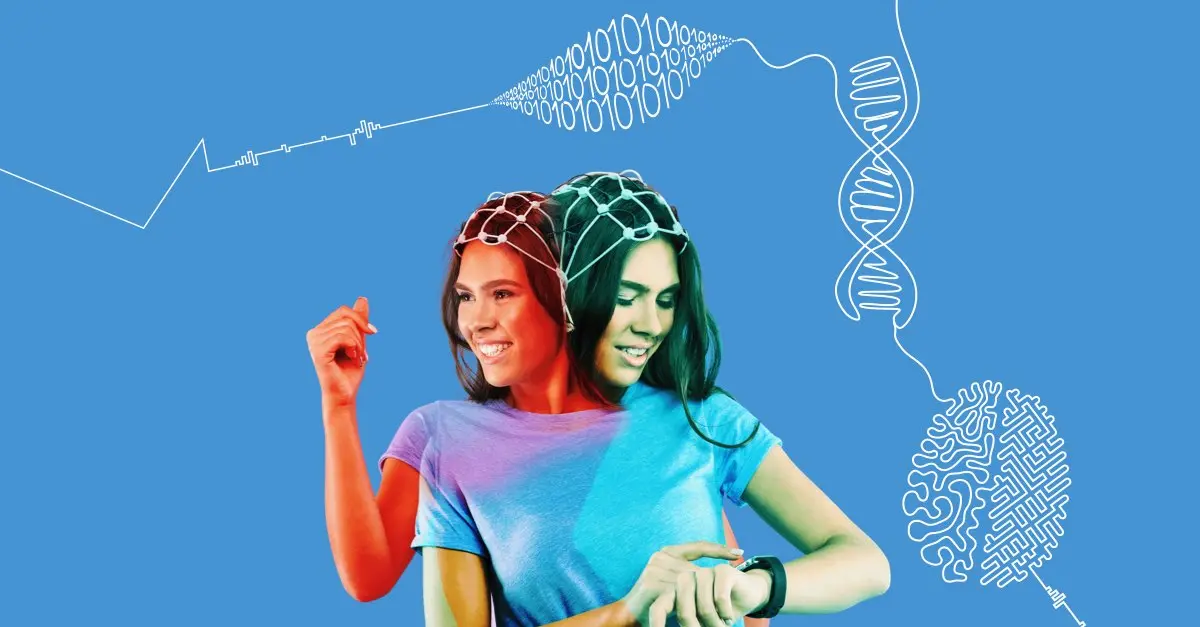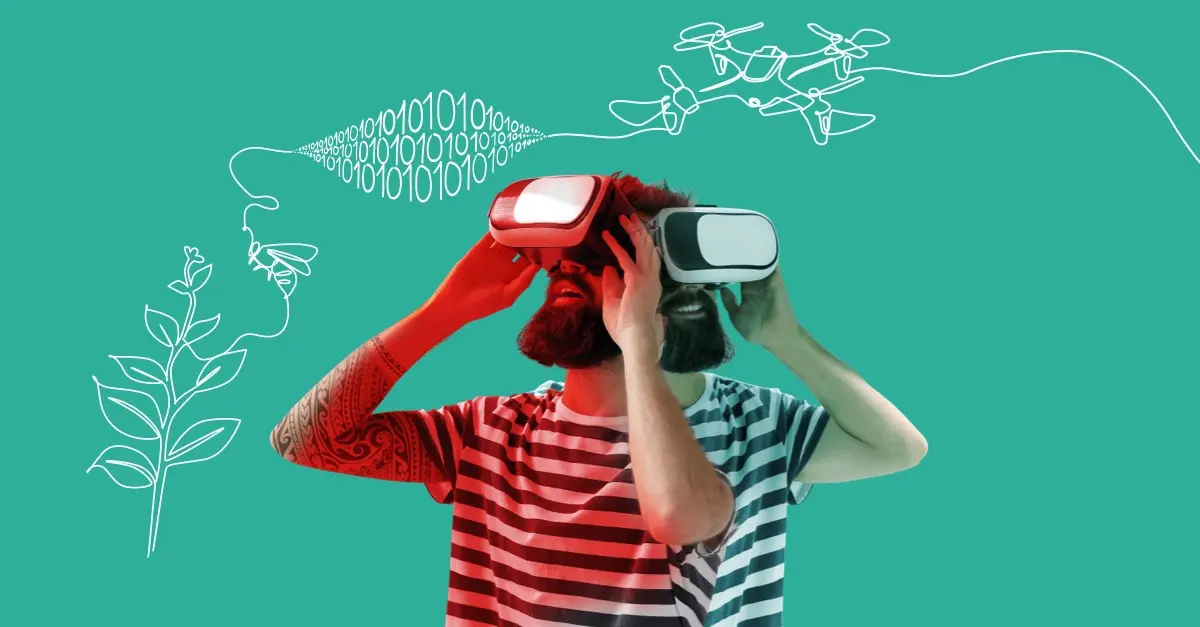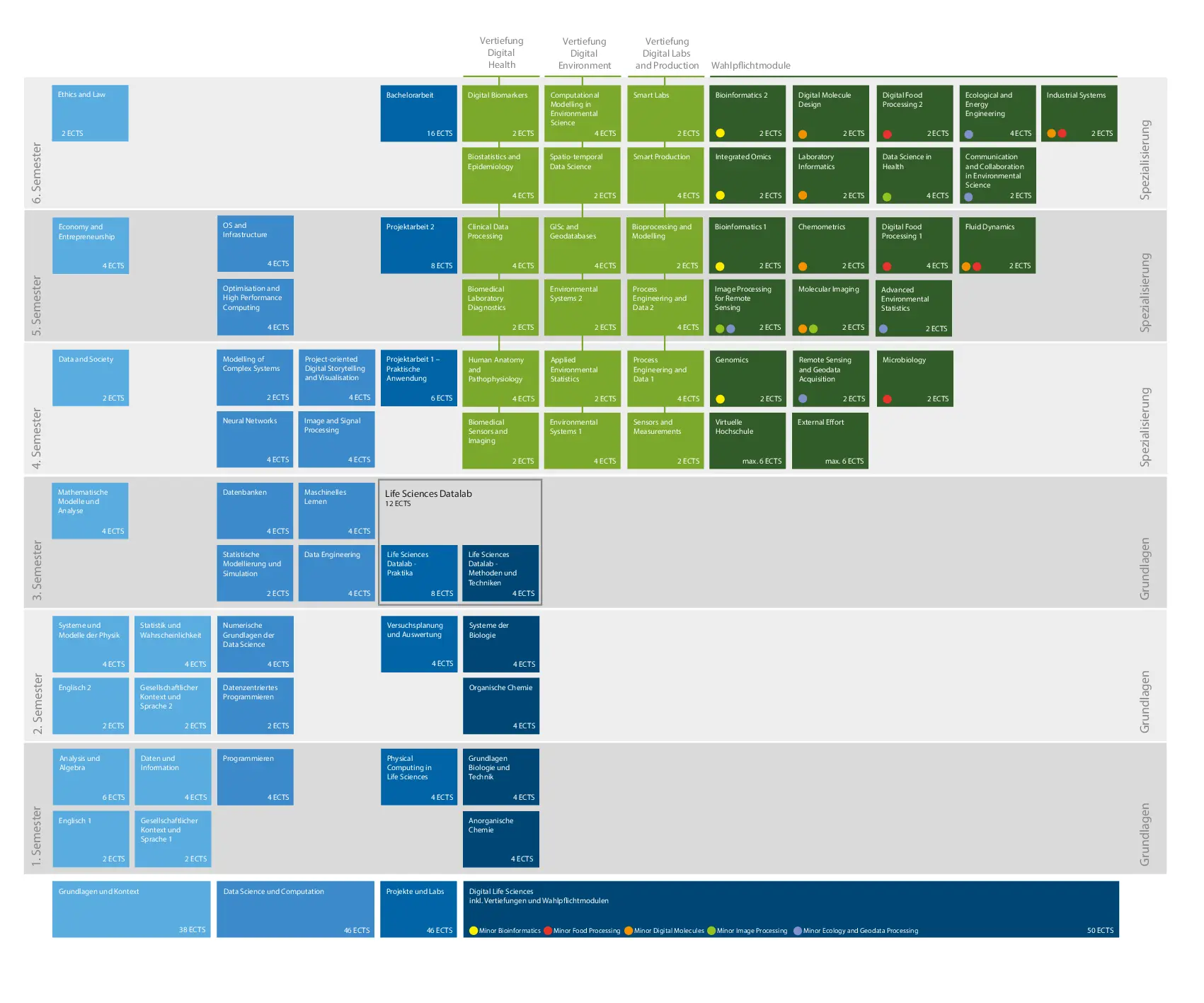Bachelor Studies Applied Digital Life Sciences
The ZHAW is the first university in Switzerland to launch a Bachelor's degree programme at the interface of digitalisation in the life sciences and data science. The rapidly advancing digitalisation in the fields of pharmacy, chemistry, biotechnology, agro-food, environment and healthcare requires specialists for the transformation from big data to smart data.

Introduction offers
Information Events at ZHAW in Wädenswil
- Saturday, April 5, 2025, Information Event for all Bachelor's Programs in Wädenswil, 10:00 AM - 1:00 PM (in German)
Online Info Event Bachelor in Applied Digital Life Sciences
Trial Study Opportunity
- Experience university atmosphere for a day (in German)
Click here to register directly to start studies in autumn 2025.
Anticipation is the greatest joy!
If you register for the study programme by April 6, 2025, you’ll have the opportunity to participate in our innovative Bachelor Kickstart Event on April 29, 2025 from 6:00 PM to 8:00 PM. This is where you’ll connect with your future fellow students and already get exciting practical insights into the Applied Digital Life Sciences programme. As the main course, we’ll serve free pizza for everyone, and for dessert, a few math exercises. :-)
Why study Applied Digital Life Sciences?
Do the fascinating aspects of the life sciences excite you? Are you particularly intrigued by people and questions about their health? Or do you ponder questions about the environment or food production? Do you also feel inspired by topics such as artificial intelligence, digital transformation and computation? If so, the interdisciplinary study programme in Applied Digital Life Sciences is perfect for you.
Rapid digitalisation in the life sciences is creating vast amounts of data that when processed intelligently, can lead to pioneering innovations and technologies as well as many "Aha!" moments. Whether it be automated early detection of diseases, computer-aided drug development, data-based generation of new food processes or species protection through drone monitoring, Digital Life Sciences make this possible.
During your studies, you will learn to deal with questions from the life sciences using various digital tools and data-based methods. You will study in a practical and realistic way in the laboratory, in nature or in production facilities and at the same time, acquire skills in programming, artificial intelligence, data engineering and simulation.
The programme will enable you to take on a key role at the interface between data science and life sciences, using your digital skills to gain valuable insights from data. Become part of the digitalisation revolution and actively shape the world of tomorrow.

«This programme, at the interface between life sciences and data science, is unique in Switzerland and opens up new, exciting career prospects for our students. The practical training concept and the Digital Labs and Production, Digital Environment and Digital Health specialisations offer plenty of scope for designing the study programme to fit one's individual needs and aspirations. Changing the language of instruction to English from the 4th semester onwards guarantees excellent preparation for an international working environment.»
Prof. Dr. Thomas Ott , Head of the Institute of Computational Life Sciences at the ZHAW
What are "life sciences"?
Life sciences encompass many areas with a focus on the environment, people and health. The study programme covers the following areas: biotechnology, biology, chemistry, pharmaceuticals, medical technology, food industry, agronomy and environment.
With a Bachelor of Science in Applied Digital Life Sciences you will...

- have a good understanding of the chemical, physical and biological foundations of the life sciences.
- know how to handle life sciences data of varying complexity and to generate knowledge from it.
- be proficient in with a variety of digital skills in the areas of programming, artificial intelligence, data engineering as well as modelling and simulation.
- take on an important role as a facilitator in shaping projects involving specialists from different disciplines.
- connect scientific, social and entrepreneurial thinking.
- have the necessary communication skills in German and English to be successful in an internationalised labour market.

«I chose the ADLS Bachelor's programme because it covers a wide range of scientific topics. We have various project work that enables us to analyse complex problems and find solutions. For example, we have learnt to use Raspberry Pis in a variety of ways. Most recently, we built a box and programmed it to measure the air quality outside and display the values immediately. Once you get the hang of programming, you can even use it to simplify everyday things. For example, I use it for my aquarium and use it to check the water quality!»
Meggie Krymowski, Student BSc Applied Digital Life Sciences

«Before starting my studies, I completed vocational baccalaureate and an apprenticeship as a laboratory technician specializing in chemistry. I chose the ADLS Bachelor’s programme because I was looking for something future-oriented, where I could leverage the opportunities of digitization while still maintaining a connection to the laboratory. I find the learning of programming, machine learning, and data engineering particularly exciting. The growing importance of topics like AI emphasizes the relevance of this programme for the future. This way, I can actively contribute to shaping digital transformation and have a positive impact on the world of tomorrow.»
Luigi Palese, Student BSc Applied Digital Life Sciences
- You will have access to an excellent infrastructure, providing you with the perfect platform from which to launch your career.
- Our practical work in all 6 semesters will fully prepare you for working life, as you learn to respond flexibly to requirements in practice.
- You will benefit from individual guidance and manageable class sizes.
- You will learn in the most beautiful location, which encourages inspiration, creativity and balance.
- We study digitally and paperless
In the first three semesters, you will acquire the relevant basic skills in science, mathematics, data science & computation and life sciences.
From the start of your studies, you will work on diverse projects and with various ZHAW research groups as well as external experts from the industry. You will apply what you have learnt directly to practical tasks and will be introduced step by step to the requirements of your future professional field.
In addition to competence in the technical disciplines, great emphasis is also placed on the acquisition of soft skills. The following core industry requirements are integrated into the projects:
- good communication skills
- interdisciplinary collaboration
- project management
- entrepreneurial ways of thinking and acting
All about Data
In the third semester, you will gain an overview of the fascinating range of topics in digital life sciences as part of the "Life Sciences Datalab" module group. You will delve deeper into the collection, analysis and understanding of data. Some examples are measuring activity with medical wearables and analysing data, land use with drone remote sensing, industrial production of ice cream or identifying unknown plants with DNA sequencing.
Deeper focus & teaching in English
From the 4th semester onwards, you can choose your own specialisation - Digital Labs and Production, Digital Health or Digital Environment. In order to prepare for an international working environment, the lessons will be held entirely in English from this point on.
Minors
Give your studies an individual profile by taking a minor in addition to choosing a specialisation. A minor consists of a compilation of subject-related, coordinated elective modules and gives you the opportunity to explore an additional specialisation. Possible minors are:
International exchange and mobility
Are you aiming for a career in an international context? We offer you attractive opportunities to give your everyday life as a student an international orientation. For example, you can spend a semester abroad or write your Bachelor's thesis in another country - the opportunities are varied and allow you to gain unique experiences.
We are also happy to welcome students from foreign universities for an exchange semester.
All information on international exchange and mobility:

«Digital Health» Specialisation
Digitalisation in the healthcare system improves diagnoses and creates opportunities for personalised treatments. Learn to tap into people as sources of data and help to better understand and prevent diseases.

«Digital Environment» Specialisation
Climate change, biodiversity loss, and the energy transition are the central challenges of the present. Your data science skills are urgently needed at the intersection with environmental sciences to develop, for example, sustainable mobility solutions, drone systems for detecting invasive plants, or intelligent networks for decentralized energy supply.

«Digital Labs and Production» Specialisation
Apply your data-based knowledge in a targeted manner and learn to optimise or reinvent various processes in the laboratory and in production.

«The programme is designed for individuals who enjoy thinking in a connected way. After all, you will not “only” be trained as, for example, biologists or data scientists but will navigate between different professional spheres. This interdisciplinary competence is in such demand that our graduates will have plenty of choice in the job market.»
Dr. Céline Reinbold, Programme Director BSc Applied Digital Life Sciences
Flexible study models
| FULL-TIME |
Duration: 6 semesters (180 ECTS) over 3 years Attendance: approx. 4 days of classroom teaching per week (3 days on site, 1 day online) |
|---|---|
| PART-TIME |
Duration: 8 semesters (180 ECTS) over 4 years Attendance: approx. 3 days of classroom teaching per week (e.g. 2 days on site, 1 day online) |
Both study models require good organisation. In addition to on-site lessons, allow sufficient time to process what you have learnt and exam preparation at home (self-study).
Participation in the start week at the beginning of the study programme as well as in further project weeks is mandatory.
Module overview
The graphic shows the classic structure of the full-time bachelor's degree programme. You determine your focus by specialising from the 4th semester by choosing one of the three specialisations "Digital Health", "Digital Environment" or "Digital Labs and Production". You can further qualify for minors by selecting specific combinations of elective modules. The elective modules are continuously supplemented and offered in collaboration with various institutes of the ZHAW.
The complete overview of the compulsory modules (blue) throughout the 6 semesters is provided in the chart below.
Employment following the completion of your studies
This combination of life sciences and data science is unique in the Swiss university landscape. The practice-oriented education of a bachelor's degree in Applied Digital Life Sciences opens up a wide range of opportunities in a rapidly growing segment of the economy, both in Switzerland and worldwide. As a graduate, you can work in the healthcare sector, environmental research and monitoring, in chemical, biotech and pharmaceutical companies or in the agri-food sector. The roles you can expect to take on include: project team member, consultant or research and development specialist.
Practical relevance
The ZHAW recognised the advantages of digitalisation long before the trend emerged and has assumed a pioneering role in the field of digital transformation. Our experts always work with the latest methods and have been implementing projects in the field of data science for more than 25 years. Furthermore, close collaboration with research and business partners guarantees that your studies will have a high practical relevance. During excursions to renowned industry partners, you will not only gain valuable insights into the latest developments, but you will also meet potential employers and learn about areas where you can apply your skills in the future.
In semester papers and your bachelor thesis, you will independently work on research or development projects, often in conjunction with an international research or partner in industry.

